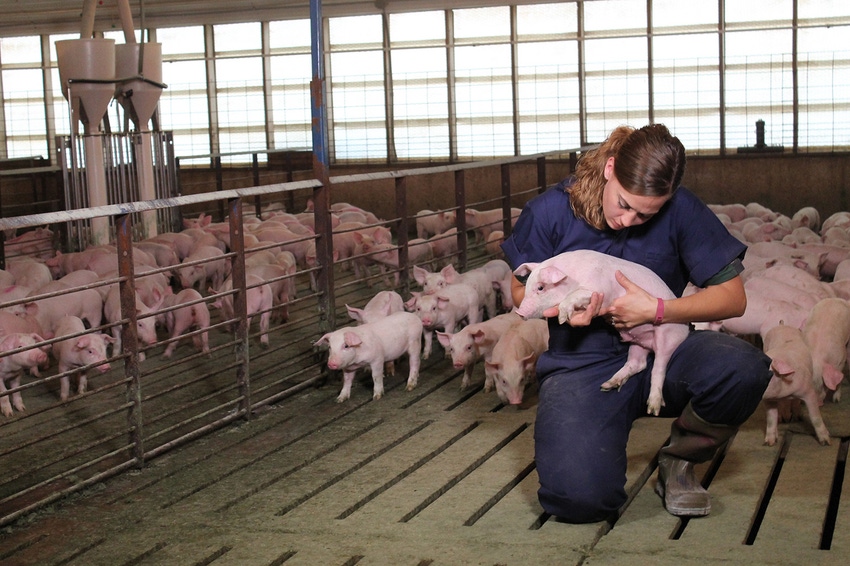Want to retain your human capital? Spend time with them
Even though employees may test your patience every now and then, and push too many buttons, that time with them is crucial to your business.

Ever since the movie “Elf” was released out on DVD in 2004, I don’t think I’ve put up a Christmas tree without hearing Will Ferrell’s voice in the background. It’s become a little tradition in our household that has carried on over the years and marks the annual month-long viewing of the film. Since we put up the tree this year over Thanksgiving weekend, I’m sure I’ve heard “Elf” playing half a dozen times. To be honest, I’m surprised our copy still works.
So, this week when I attended a session on managing human capital at the Midwest Pork Conference led by Emily Erickson with New Fashion Pork, I couldn’t help but chuckle when she compared the scene where Buddy the Elf lights up all the buttons in the elevator to her own children some days testing her patience. So true.
But as Erickson points out, somedays the same can be said of our employees.
“I think that’s our kids sometimes and then also sometimes that can be our employees. They are going to test our patience,” Erickson says. “They are going to push us harder, but that is where we as supervisors, as farm owners, need to take a step back and say ‘I’ve got to reflect on this a little bit. What am I doing right and wrong with this employee? What’s working with them and what’s not working? Have I spent time with them? Have I not?’”
Currently the animal well-being and quality assurance manager for NFP, Erickson has had extensive experience in the company’s employee development program, first starting out as intern there nine years ago to now helping recruit interns and future employees. Her topic, “Embracing and Encouraging Culture Change, Training and a Hungry Work Force,” is one that continues to be a challenge for the industry. In the National Pork Board’s 2016-17 “Employee Compensation & HR Practices in Pork Production” report, the average turnover rate for animal caretakers on large and small- to mid-sized operations was 35.03% and 20.34%, respectively.
So, what can the industry do differently?
“I think we, as producers, need to take an honest evaluation of ourselves and our business and say, ‘what type of manager are we, where is our business at, and are we a coach for our employees or are we simply managing our employees?’” Erickson says.
Erickson says one of the key differences to coaching versus managing is time allocation. What is important versus urgent? It’s a concept from best-selling author and renowned business speaker Nathan Jamail that Erickson says the pork industry should consider.
For example, a well pump that doesn’t work or a truck that slid into the ditch while being loaded may be urgent matters, it may be more important in the long term to attend that Monday morning meeting, to keep that scheduled visit with a contract grower or to reach out to that employee who lost his or her Dad this week.
“Quite naturally we all want to go take care of the urgent manners. I must have water for my pigs. I’ve got to go fix the well today. But what if we just let the fire burn for a little while,” Erickson says “What if you allow your right-hand guy on the farm, your hired man on the farm, to take care of the well situation so you can have your Monday morning meeting with your 10 sow-herd employees? Where is your time better spent in that situation?”
Erickson says while the hired man may not get it right the first time, it’s a valuable learning opportunity to take him to the next level.
“When you take time to deal with the important matters on your farm, the time spent with your employees, you are investing in every single one of your employees and for the employee that had to take care of the urgent manner, you are allowing room for growth,” Erickson says. “For the rest of the team, you are building a relationship with them and you are building trust and confidence in you by being there.”
As coaches, Erickson says know what your intent is. Do you need to provide instant feedback or positive support? Do you need to be more hands-on or train the trainer? How can you teach your employees through questioning to solve problems?
And finally, how much time do you spend practicing?
“As Nathan Jamail says, ‘athletes practice 90% of the time,’” Erickson says. “Why can’t we use that same model in our industry and stop that constant baptism by fire. If you’re allocating time for the important matters, you’ll have time to train, time to follow-up, time to check on other things that are important to your business.”
And even though employees may test your patience every now and then, and push too many buttons, that time with them is crucial to your business.
“Your employees will stalemate and go back to old habits, if you are not investing time with them every day,” Erickson says.
About the Author(s)
You May Also Like





